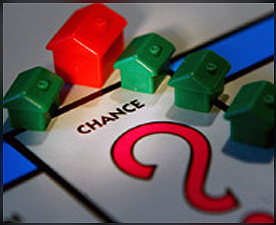 There is a reason to do every deal. And there is a reason NOT to do every deal.
There is a reason to do every deal. And there is a reason NOT to do every deal.
I do real estate deals. No deals? No growth. No progress. Do bad deals, bad things happen. Do good deals, good things happen. But how to tell the difference?
At either end of the extreme, it is obvious. But those generally are eliminated before they hit my desk by those who report to me using the investment screen we have set up. Sometimes a deal appears to fit our box but on closer examination, on greater due diligence, flaws appear, numbers don’t plan out, pro forma projections are too fluffy. (It is the nature of all pro formas to be fluffy. I just want the pro forma to have a faint resemblance to a someday——perhaps possible——reality).
In business school I was taught this simple 5 step process:
- Determine your cost of capital.
- Determine the returns of all potential investments.
- Rank them.
- Invest until your cost of capital equals the return on your marginal investment.
- Go home and relax, maybe take a vacation.
Yeah. Right. Gotcha. No Problemo. Life should be so simple.
Let’s see. Where does reality diverge from theory? Let’s not even talk about swings in the cost of capital. Let’s start with how hard it is to determine potential returns. Let’s start with how hard it is to determine facts, and how few hard-and-true, never-wavering facts there really are.
You see, we are trying to determine FUTURE returns here, which means we need to start projecting future occupancy rates, future rents, future collection rates, future leasing concessions, future expenses, future property taxes, future labor rates, future insurance rates, future marketing costs, future just about everything!
Including predicting several biggies: future inflation rates, future interest rates, and the future sales price. Not to forget, predicating how your competition and customers will react to everything you do. Oh, yeah, almost forgot: need those customers big time! Can’t forget about the customer. Kind of an important variable in the equation, don’t you think?
The point is that when you are far away from the numbers, when you are sitting in a quiet corporate office a thousand miles away, you might choose to believe the projections in those pro formas. But when you are on the street, you KNOW how many educated guesses go into them. And if you have any brains, and you have any money in the deal you can’t afford to lose, it should scare the heck out of you.
Let’s also not forget that marketplaces tend to converge around the middle of the bell curve. Every seller is trying to get the maximum, every buyer is trying to pay the minimum, any outliers on the positive side (bargains) get snapped up quickly, outliers on the negative side (obviously overpriced) sit and sit. The middle gets pretty crowded. People jostling, elbowing each other for a few tenths of a place advantage in potential/expected (future) return, hoping they can see opportunities, possibilities, that others do not. Hoping they are not kidding themselves.
So, how to decide? Which one is mediocre? Which one is the winner? How to pick which deal?
I could tell you but then I’d have to shoot you. Not because I told you anything terribly important but rather because I told you something terrible: I don’t know how to decide! At least not in any way I can put into a formula.
Instead, you push, you prod, you do due diligence until you feel as if you have been over every nail in the place, every number in the books. You check the market over and over, shopping it, testing it. You brainstorm with your people.
And then, if it has been subjected to every objective test possible, you use the final subjective test: You listen to your gut intuition. My gut is not always right, my intuition is not a perfect guide. But I’ve been in this business for more than 30 years and I’ve made enough mistakes to be able to start making fewer of them.
I’m a cautious guy and I scare easily. I may not do as many deals as some, but my deals hold up. I don’t make many mistakes, and even my mistakes do fairly well. They return single digits——high single digits——instead of the nice fat double digits they are supposed to.
Remember: There is a reason to do every deal. And there is a reason NOT to do every deal. Know the reasons and know them well.
Keep this in mind, run scared all the time, and you will prosper nicely in the good times and sleep well in the bad times.


0 Comments